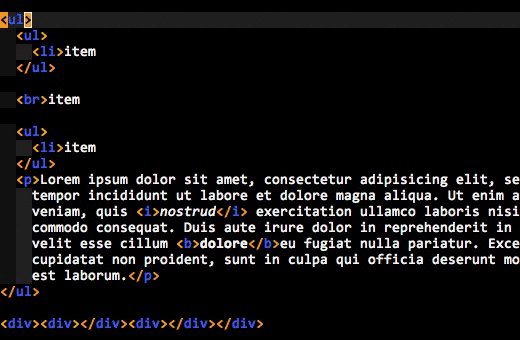The MatchTagAlways.vim (MTA) plug-in for the Vim text editor always highlights the XML/HTML tags that enclose your cursor location. It's probably easiest to describe with a screenshot:
It even works with HTML templating languages like Jinja or HTML5 use-cases like unclosed tags. It's pretty smart and should do the right thing in most cases. If it doesn't, report the problem on the issue tracker!
Use Vundle to install the plugin. You are using Vundle to manage your Vim plugins, right? Pathogen works fine too (but I recommend Vundle).
Note that the plugin requires that your copy of Vim is compiled with Python
support. You can check for this with :echo has('python') in Vim. If the output
is 1, then you have Python support.
After installation you should be done. The plugin should be plug & play. It will automatically turn itself on for HTML, XML and a few other HTML-like filetypes. You can also explicitly turn it on for other filetypes too (more details in the Options section).
All options have reasonable defaults so if the plug-in works after installation you don't need to change any options. These options can be configured in your [vimrc script] vimrc by including a line like this:
let g:mta_use_matchparen_group = 1
Note that after changing an option in your [vimrc script] vimrc you have to restart Vim for the changes to take effect.
This option holds all the filetypes for which this plugin will try to find and highlight enclosing tags. It's a Vim dictionary with keys being Vim filetypes. The values set for those keys don't matter and are not checked, the only thing that matters is that a key is present in the dictionary (VimL has no sets).
You can find out what the current file's filetype is in Vim with :set ft?.
Don't forget that question mark at the end!
Default: { 'html' : 1, 'xhtml' : 1, 'xml' : 1, 'jinja' : 1 }
let g:mta_filetypes = {
\ 'html' : 1,
\ 'xhtml' : 1,
\ 'xml' : 1,
\ 'jinja' : 1,
\}
When set to 1, forces the use of the MatchParen syntax group. This is the same group that Vim uses to highlight parens, braces etc. This option is useful for people who want to use the same highlight color for both constructs.
When set to 0, MTA will use a custom MatchTag syntax group with a default
highlight color. See the g:mta_set_default_matchtag_color option for
instructions on how to change that color.
By default, this option is set to 1 because this makes it very unlikely that
your colorscheme will conflict with the default colors used for the MatchTag
group. It's the safe choice. Feel free to toggle this option to 0 (the author
uses it like this).
Default: 1
let g:mta_use_matchparen_group = 1
This option only makes sense when g:mta_use_matchparen_group is set to 0. When
it is, g:mta_set_default_matchtag_color option can be used to prevent MTA from
overwriting any color you have set for the MatchTag group.
So, if you want to use a custom color for tag highlighting, have both
g:mta_use_matchparen_group and g:mta_set_default_matchtag_color set to 0 and
then set a custom color for MatchTag in your vimrc. For example, the
following command would set a light green text background and a black foreground
color ('foreground' is the text color):
highlight MatchTag ctermfg=black ctermbg=lightgreen guifg=black guibg=lightgreen
See :help highlight for more details on text highlighting commands.
Default: 1
let g:mta_set_default_matchtag_color = 1
You can use the plugin to also go to the closing tag if this tag is in the visible screen.
Jumps to the enclosing tag if the tag is visible. If you are on top of an opening tag, it will jump to the closing tag. If you are on the closing tag, it will jump to the opening tag. If you are inside a tag, then it will jump to the closing tag.
Setting a mapping for this command:
nnoremap <leader>% :MtaJumpToOtherTag<cr>
The plugin only scans the lines that are visible in your window. If an opening tag is visible but the closing tag is not, no tag will be highlighted. This is for performance reasons (ie. what happens if the user opens a 10k HTML file?).
It's also possible that the plugin's parser is just out of ideas on how to extract the enclosing tags out of your text. This should be very rare though.
If you have questions, bug reports, suggestions, etc. please use the issue tracker. The latest version is available at http://valloric.github.com/MatchTagAlways/.
The author's homepage is http://val.markovic.io.
This software is licensed under the GPL v3 license. © 2012 Strahinja Val Markovic <[email protected]>.
